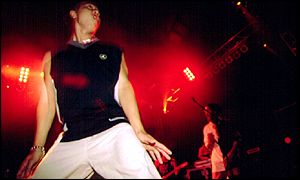
Teenagers threw grenades, nerds launched reconnaissance missions, joystick-juggling twentysomethings waved their arms in the air like they just didn’t care.
This is the future according to Colin Cowlan, video games enthusiast and electronic musician, who drew almost 100 hardcore gamers to one of Britain’s most ambitious computer games party in Cardiff over the Bank Holiday weekend.
Geeks, one might expect. But Ulsterman and LAN (local area network) party organiser Cowlan would argue the contrary.
His electronic band Manchild blasted into the top 40 chart last week and, with Dragon-LAN, a bring-your-own weekend gaming bash, he has taken the first steps in blowing away the myth that computers ain’t cool.
Held at Cardiff University’s student union over three days and nights, Dragon-LAN tore up conventional LAN party rules to redefine the traditionally sober game playing get-together genre.

Some of the best online gamers in Britain hauled along their computers, shot each other in cyberspace and, in some cases during the multi-player marathon, took advantage of the sleeping facilities.
Different strokes
The party was the first to boast DJs and techno music alongside the screen action in a bid to absorb electronic entertainment into popular culture, making games trendy.
So successful was the attempt, organisers now hope to set up a company specialising in the events and in running games servers.
Cowlan, whose online nickname is ‘Belfast’ and who organised Wales’s first games bash after being bitten by the multi-player bug, says the clientele was “eclectic”.
“I would definitely say these events are becoming the new clubbing,” he told BBC News Online.
“We were getting musicians, skateboarders, network engineers, accountants, DJs and breakdancers.”
Popular culture
As the assembled enthusiasts from as far as Newcastle and Liverpool vented the £25 entry fee on each other in a hail of virtual bullets, Manchild’s resident breakdancer Kwam Chang put on a floor show. Radio 1 presenter Neil Hinchley was also there. This was gaming culture, but not as we know it.
“It’s breaking the perception of video gaming as a solitary activity. This is much more social – we treated it exactly like a gig,” Cowlan added.
“These people are hooked on movies, music and popular culture. We’re trying to show that it’s not just geeks who play computer games.”

Online gaming is taking off around the world. According to research firm NetValue, one in five UK internet users plays human beings at games like Quake, Counter Strike and Doom.
There are 194,000 regular participants, compared with 4.8m in the more mature US market and 6m world-wide players of Counter Strike alone.
Players fight in “clans” of unseen gamers from around the world or just around the corner, but at LAN parties they meet in the real world to play.
Young gamer
At 34, and probably the oldest Counter Strike fan at his party, Cowlan – who moved to study in the Welsh capital six years ago – was beaten by the UK Quake III champion, feared Aaron Jones, 16, from the city.
A professional ‘cyberathlete’ and part of a 40-strong Italian clan, the teenager became the country’s best gamer at the Cyberathlete Professional League contest in London in April – he was already Welsh champion.
Only just out of GCSE classes, he has won over £1,000 in prizes. The CPL promptly raised the minimum age limit to 17.
He was put up for challengers to topple, but mostly left the dance floor strewn with losers.
“I am probably the best player in the UK,” he says, unswervingly. “That’s pretty cool.
“It took five years of practice to get where I am now, at three to five hours each day.
“I’ve played thousands of online games and won more than I’ve lost, so I’m pretty confident.”
Great games
He expects to come through the next London qualifiers to fight for the US$300,000 prize at the first World Cyber Games championships in South Korea this December. It will be the Olympics of the joystick world and Jones predicts gaming will become a televised sport within five years.